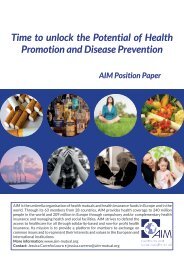Exploring patient participation in reducing health-care-related safety risks
Exploring patient participation in reducing health-care-related safety risks
Exploring patient participation in reducing health-care-related safety risks
Create successful ePaper yourself
Turn your PDF publications into a flip-book with our unique Google optimized e-Paper software.
<strong>Explor<strong>in</strong>g</strong> <strong>patient</strong> <strong>participation</strong> <strong>in</strong> reduc<strong>in</strong>g <strong>health</strong>-<strong>care</strong>-<strong>related</strong> <strong>safety</strong> <strong>risks</strong><br />
88<br />
The number of reported ADRs has <strong>in</strong>creased s<strong>in</strong>ce 2004 due to unsafe prescrib<strong>in</strong>g<br />
practices that do not observe the necessary limitations on use of medic<strong>in</strong>es. Research<br />
<strong>in</strong>dicates that medic<strong>in</strong>es have been prescribed to populations known to be susceptible to<br />
a certa<strong>in</strong> type of ADR.<br />
The fact that 38% of the doctors that responded to the survey treated <strong>patient</strong>s with<br />
ADRs result<strong>in</strong>g from use of dietary supplements or herbal remedies po<strong>in</strong>ts to a problem<br />
with the commercial <strong>in</strong>formation on dietary supplements <strong>in</strong> <strong>patient</strong> <strong>in</strong>formation leaflets.<br />
These may emphasize the anticipated advantages without highlight<strong>in</strong>g the potential<br />
<strong>risks</strong> (adverse reactions that might result from medic<strong>in</strong>es <strong>in</strong>teractions and the ADRs<br />
these supplements may <strong>in</strong>duce). A similar observation relates to herbal medic<strong>in</strong>es. These<br />
are commonly considered to be very safe, yet research proves this assumption to be<br />
untrue, as herbal substances may modify the performance of other medic<strong>in</strong>es and also<br />
<strong>in</strong>duce serious ADRs (8).<br />
An additional reason for ADRs and drug-<strong>in</strong>duced illness can be the nonstandardized<br />
content of a <strong>patient</strong>’s medical history, alongside medical professionals’ characteristic<br />
lack of <strong>in</strong>terest <strong>in</strong> the <strong>patient</strong>’s medic<strong>in</strong>e profile. This can lead to unacceptable<br />
repeated exposure to certa<strong>in</strong> drugs <strong>in</strong> <strong>patient</strong>s <strong>in</strong> which <strong>in</strong>teractions and previous drug<br />
hypersensitivity have already been recorded.<br />
Recommendations<br />
The study results po<strong>in</strong>t to two ma<strong>in</strong> f<strong>in</strong>d<strong>in</strong>gs:<br />
1 . poor medic<strong>in</strong>e practices exist<strong>in</strong>g at PHC level, <strong>in</strong> terms of: doctors’ <strong>in</strong>terest <strong>in</strong><br />
<strong>patient</strong>s’ medic<strong>in</strong>e profiles; quality of medic<strong>in</strong>es <strong>in</strong>formation provided to <strong>patient</strong>s<br />
dur<strong>in</strong>g visits; content of communication regard<strong>in</strong>g <strong>patient</strong> medic<strong>in</strong>es; and ADR<br />
report<strong>in</strong>g rates; and<br />
2 . poor quality and low volume of <strong>patient</strong> education concern<strong>in</strong>g pharmacotherapy<br />
and the <strong>in</strong>adequate use of potential sources of medic<strong>in</strong>es <strong>in</strong>formation, as well as the<br />
absence of <strong>patient</strong>- and provider-focused medication <strong>in</strong>formation centres.<br />
These f<strong>in</strong>d<strong>in</strong>gs – if validated on a larger scale – require urgent communication with<br />
appropriate authorities and stakeholders to determ<strong>in</strong>e <strong>in</strong>itiatives required to improve<br />
pharmacotherapy <strong>safety</strong> at PHC level.<br />
The recommendations that follow are made with respect to: (a) the <strong>health</strong> <strong>care</strong> system<br />
level; (b) the professional level; and (c) the <strong>patient</strong> level.<br />
Recommendation 1 – Organize medication <strong>in</strong>formation centres (<strong>health</strong> <strong>care</strong> system level)<br />
Cont<strong>in</strong>uous pharmacotherapy use calls for a system of medication <strong>in</strong>formation centres to<br />
be set up for <strong>patient</strong>s, doctors, pharmacists and other stakeholders. Such centres would<br />
provide broad-scale, reliable <strong>in</strong>formation about medic<strong>in</strong>es, <strong>in</strong>dications, contra<strong>in</strong>dications,<br />
<strong>in</strong>teractions and the pr<strong>in</strong>ciples of safe and effective polypharmacotherapy. Added<br />
value would be attributed by learn<strong>in</strong>g to l<strong>in</strong>k medications <strong>in</strong> a rational way, us<strong>in</strong>g<br />
their complementary performance mechanisms and limit<strong>in</strong>g polypharmacy (l<strong>in</strong>k<strong>in</strong>g<br />
medications that do not contribute to <strong>in</strong>creas<strong>in</strong>g jo<strong>in</strong>t therapeutic effects, but rather



